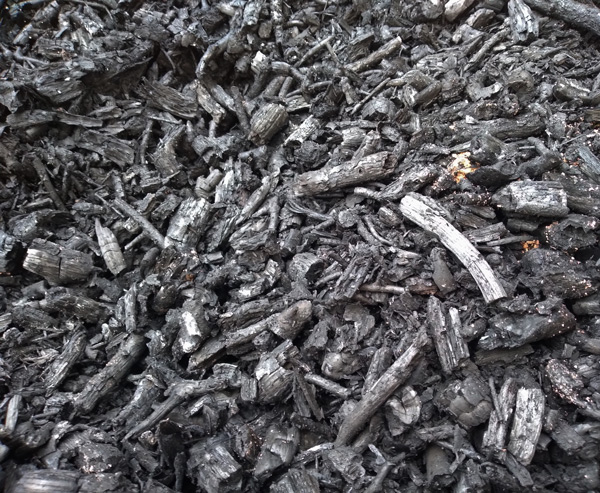Dieter asks about charcoal removing Grazon:
Once charcoal has absorbed the Grazon, what happens then? Does it stay there? Do I have to collect the contaminated Charcoal? How? Charcoal is also recommended as moisture buffer, absorbing and releasing moisture. Together with Grazon?
This is a good question – I’ve had some of the same thoughts myself. Some years ago I wrote a post on spotting Grazon contamination in the garden and fixing it.
Charcoal was a part of that plan. It does really seem to soak up the Grazon. And, in regards to Dieter’s questions:
- The Grazon no longer effects your plants
- My theory is that the bacteria and fungi in the soil break down the captured toxin
- No – it just stays in the beds
- It seems to take up more Grazon than it releases, if it’s releasing anything
This is not exact science here, either. We don’t know exactly what the charcoal is doing in the soil, other than seeing that a friend’s tomato plants with charcoal around them didn’t get hit by Grazon as badly as those without the charcoal. There seems to be an absorption going on, if not a complete destruction of the toxin. We’ve also read that charcoal provides many millions of minute pores which function as habitat for fungi, bacteria and other microlife – and one of the ways Grazon breaks down is through the action of microbes in the soil.
The best thing to do is to never add anything to your garden which might possibly be contaminated with Grazon or any of its kin. This means avoiding purchased hay, compost, mushroom compost, manures and possibly straw. It’s a terrible inconvenience, but the supply line is almost irredeemably corrupted at this point.
Make your own compost or play Russian Roulette.


13 comments
Our supplier of clean hay isn’t selling this year. Oy.
But then we thought of a farmer we know. We buy a1/2 steer from him every year. We called, and he understood about the need for clean hay. We got 20 square bales of grass and clover last week. With what we cut (by hand) from certain areas of our little place, we have enough, again.
Unlikely that a farmer raising grass-fed natural beef will decide not to hay in the future, like the previous supplier.
God is good.
I am so glad.
Years ago we heeded your warnings concerning this corruption in our attempts to provide nutrition to our families by growing winter rye in most of our garden during winter to provide mulch for spring and summer growth. Composting is the norm. Our habits to grow without devastating inputs have been a blessing to our family thanks to you and yours. I just don’t mention that those bins in the kitchen have worms inside :).
Now if we could just grow politicians to avoid corruption…
Interesting that today’s live stream had you mention that ethics are negotiable subject to proportion and relativity. That’s is just flat honest.
It depends on if it’s God’s laws or trying to balance negatives where one outcome might be better or worse but there’s some moral grey area. For example, you might lie to save someone’s life, but if you lie to make people like you it’s a different ballgame.
I do hate the poisons, though. Especially the long-term herbicides, where you also run the risk of downstream poisoning effects that could hurt others as well.
Yes, sir! Your passion for H8ing on these unconcerned corporations is so appreciated. The demonization of hemp fiber for petroleum profits is another biggy. No Hemp Island in the Pacific!
Know that anyone who wants to talk gardening with us hears your voice loud and clear!!!
Also nice to hear a parent of 10.5 kids unwavering in God’s law!!
I started composting thanks to David. I added all our grass clippings to the compost pile. I saw a few of the posts on Grazon and I realized I had used a product with clopyralid on the lawn the previous year. According the the manufacturer it can affect the subsequent crops (peas, bean) up to 22 months after application. There was a 2 year period between the lawn application and when I put the compost on the garden. Fortunately the compost grew beans when tested and hasn’t affected the plants where we had put the compost. No more deadly chemicals on the lawn, it’s not worth the risk.
Biochar is the miracle amendment.
This video touches on biochar and grazon from the pov of a soil scientist if it is any interest https://youtu.be/_Mrj7ZOTzio?t=1064
Thank you
We’re getting ready to buy land that is currently being used for pasture. This pasture looks suspiciously free of broadleaf plants. Will persistent herbicides ever break down, so that we could plant a garden on this property?
Usually within 2-3 years or so, yes. Faster if you till it repeatedly.
Comments are closed.